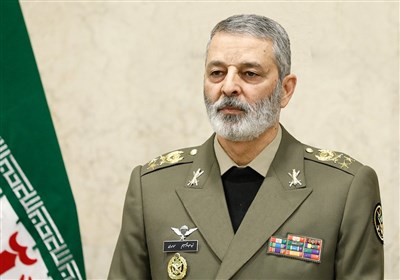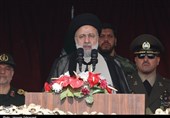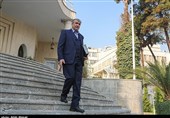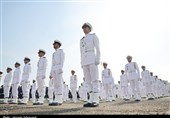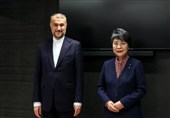An Argument against Ronen Bergman’s 'The Secret War with Iran' – 34
TEHRAN (Tasnim) – The US was willing to spare itself any harm from the Islamic movement due to its exposure to tough conditions in the Muslim world, but it does not mean that Washington had dispatched a high-ranking delegation to Tehran without receiving any signal from so-called moderates first.
Iranian journalist and expert Abbas Salimi Namin has disproved the claims and opinions of Israeli analyst Ronen Bergman in the book ‘The Secret War with Iran’. ‘The Secret War with Iran’, written by renowned Zionist journalist Ronen Bergman, was published in 2008 by Simon & Schuster publishing company in the United States.
Born in 1972, Bergman is a graduate of Tel Aviv University in the Middle East political relations. He is a famous Zionist journalist and analyst in the military and security fields who has worked with Israeli newspapers ‘Haaretz’ and ‘Yedioth Ahronoth’, American dailies and weeklies such as ‘The New York Times’, ‘Newsweek’, ‘The Wall street Journal’, and British media groups including ‘The Guardian’ and ‘The Times’.
Bergman has been interested in topics relating to the enemies of the Zionist regime (particularly Iran, Hezbollah and the Palestinian resistance groups), as well as subjects on the history of the Israeli regime’s assassination operations, which are cited in his recent book ‘Rise and Kill First’.
In an interview with Persian TV channel ‘Iran International’, Bergman has pointed to the Iranian nuclear program and the issues surrounding it -particularly the Zionist regime’s secret attempts to halt the process of nuclear activities in Iran and assassinate Iranian scientists. He has also cited ex-CIA chief Michael Hayden as saying that the assassination of nuclear scientists is the best way to impede Iran’s growing process in that field, and has implicitly held Israel responsible for it.
In the book ‘The Secret War with Iran’, Bergman has written a history of encounters between Iran and the Zionist regime, while the bulk of the book relates to the Lebanese Hezbollah -Iran’s main ally in the battle against the Zionist regime since its formation until the 33-day War- focusing on the role of Martyr Imad Mughniyeh.
His book also includes sections about the final years of the Pahlavi regime and victory of the Islamic Revolution in Iran, short periods of the war imposed by the Ba’thist party of Iraq on Iran (focusing on the McFarlane affair), Iran’s role in supporting the Palestinian groups, and the Iranian nuclear program.
Bergman’s multiple undocumented and untrue comments as well as personal and purposeful analyses (with the main purpose of displaying Israel’s power, especially in a competition with the US) that have repeatedly come in his book make a critical review of the book necessary for Iranian readers.
Director of the Iran History Studies and Compilation Bureau, Abbas Salimi Namin, has written an extensive criticism in a book about ‘The Secret War with Iran’. Born in 1954, Salimi Namin is an experienced journalist and a renowned Iranian researcher in history and political sciences who has published many articles and books.
About ‘The Secret War with Iran’
Part 34:
Meantime, in the draft agreement following the talks in Tehran, emphasis is laid upon a new round of ties between the two nations. “On this 27th of May 1986, the Government of the United States of America and the Government of the Islamic Republic of Iran, in light of mutual understanding and recognizing the significance of establishment of mutual respect, trust and guarantees for a new round of bilateral ties agree on the following points:…” (Ibid, p. 139)
Specifically the Americans’ willingness to renew ties with Iran relied on so-called moderates within the Islamic establishment. Was the willingness for mending fences with the US a deception tactic to receive arms and military hardware? There is evidence suggesting that willingness for renewed ties with Washington was by no means trickery. The Americans involved in the McFarlane issue assumed that Iran had changed position as seen in the words and deeds of certain officials. Those who seek to cover up such facts claim that if the Americans really planned to remove any mistrust for improving ties why did they fool Iran by sending outdated equipment and surcharging the country? One of such persons is Mohsen Hashemi Rafsanjani who has published The Story of McFarlane on behalf of his father. “Such secret and insincere talks through arms dealers who had cheated on the quality and price of weapons could never result in official and permanent ties, particularly because the Americans were well aware of Iranian officials’ mistrust of the US and unwillingness to reopen ties with that country. They also knew quite well that Iran was just seeking to supply its vital arms needs…The Americans who have spoken mainly about the process of arms sales to Iran for the purpose of the US coming closer to the Iranian government and also about efforts for the reversal of US hostile policies against the Islamic Republic have in fact sought to crate important political and international motivations for the illegal act of the Reagan Administration…Such analyses have been raised both outside and inside Iran, which are all after specific motivations. Even the Tower Report which was prepared on the process of arms sales to Iran was a smart attempt for passing the puck on others and spare the president another scandal and preventing an Irangate similar to Watergate.” (Ibid, p. 35)
This narrative is in conflict with evidence on hand or even with remarks by Mr. Hashemi Rafsanjani. In his memoirs, Rafsanjani has said some heads of branches of government were willing to reopen ties with the US following McFarlane’s visit. “At night, along with other branches of government, were invitees at Ahmad’s house…We held talks about the US insistence on renewal of ties with Iran. Proponents and opponents both expressed their views. We did not reach any conclusion. We decided to continue talks in more sessions after arranging with the Imam.” (Hashemi Rafsanjani’s Memoirs, p. 128).
Rafsanjani has not specified the proponents and opponents. However, his personal position becomes clear based on stances he has taken. However, several points might be interesting to readers: 1. Is raising the issue of renewed ties with the US at the meeting of heads of branches of government immediately after a visit to Tehran by a high-ranking American delegation related to it or not? 2. Has the initiator of laying the groundwork for renewed ties with the US acted based on the general policy of the establishment or not? 3. Why has Mr. Rafsanjani kept the issue at abeyance after the heads of branches of government decide to discuss it with Imam Khomeini? 4. Is it just a random case that a group inside the country pursue the policy of resuming diplomatic ties with the US exactly when the latter insists thereupon?
Therefore, one cannot claim that the Americans’ willingness for renewed ties in a way to defame Iran has been one-sided. Logically, the US was willing to spare itself any harm from the Islamic movement due to its exposure to tough conditions in the Muslim world, but it does not mean that Washington had dispatched a high-ranking delegation to Tehran without receiving any signal from so-called moderates first. Mr. Hashemi Rafsanjani sheds light on willingness for ties. “Around noon, my nephew Ali, just retuning from Europe, came to me. He had met with two US officials. The visit was arranged by our charge d’affaires in London. The Americans wanted normalization of ties.” (p. 241)
In another passage, he writes: “The Americans are sparing no effort to resume ties with us and they resort to every tool.” (p. 243)
Even if we admit that Mr. Hashemi Rafsanjani had no plan to positively respond to the US insistence on reestablishment of ties we cannot close eyes to the fact that he had used these conditions to boost strategy regarding the war. All those who know Mr. Hashemi Rafsanjani know quite well that he was a person with long-term plans. It was not that this well-known figure be overcome by obstacles emerging in his way; rather, he always practiced patience and tested various options directly and indirectly to finally reach his objectives. As Mr. Rafsanjani has honestly said, his policy and strategy vis-� -vis the Iraqi invasion was summarized in this slogan: “War, War to Victory”. Unfortunately, success of this slogan was tied in 1985-1986 to arms purchase from the US in return for the release of Western hostages held in Lebanon. Definitely, when Iraq was trying hard to bring a halt to Iran’s oil exports, launching attacks on cities and civilians, flying planes to make the entire Iran unsafe, firing long-range missiles and even using chemical arms, it was necessary and vital for Iran to acquire military equipment. But Mr. Rafsanjani seems to have used the necessity of indirect talks with the Americans for supplying arms to the fronts (which all heads of branches of government and the Imam agreed) to serve his third and fourth objectives. Such policy would definitely undermine the main war strategy and yield inverse results. As a war historian puts it, “Mr. Rafsanjani maintains that his strategy of seizing a strategically important zone and ending the war was correct, but shortcomings and incapacity of military forces did not let them materialize because all operations he approved and supported had strategic objectives. In case those objectives had materialized, it was easy to end the war, but military forces could not realize those objectives.” (The End of the War, Mohammad Doroudian, War Studies and Research Center, p. 27)
He writes in the footnote: “On the other hand, military forces particularly Islamic Revolution Guards Corps (IRGC) believe that lack of a military strategy and insistence on an operation for ending the war was the cause of failure. They argue that after the liberation of Khorramshahr, which was achieved following a series of operations, we needed a strong victory in the war before ending it, and it was possible only by working out a military strategy and designing and executing a series of operations.” (Ibid)
Without any intention to scrutinizing the role of the “War, War to Victory” slogan in the failure of warfronts, we only highlight the fact that multiple strategies in wartime would cause frustration. The consequences of lack of unity in mind and deeds at an unequal war were no secret to anyone. But Mr. Rafsanjani was for any reason whatsoever insisting on bringing an end to the war by relying on a successful operation and politically satisfying the US. The Americans did not like to see the Iranian nation win the war and were ready to enter an arms deal with Iran. If Washington was sincere in renewing its ties with Iran, why did it turn out to be insincere in arms supply? The response to this question lies in the US anxiety over the possibility of Iran getting military equipment to win the war. Therefore, outdated and ineffective arms were sent to Iran. Therefore, the US also intends to play a role within the limits of Mr. Rafsanjani’s strategy; i.e. assisting in only one successful operation and nothing more. It has to be noted that Washington did not see this policy to be in conflict with its subversive project. Therefore, he assigned the task of talks with moderates to a body established to overthrow the Islamic republic. On this point, Bergman writes: “The Americans envisaged acting on a number of tracks. One was through a company set up in the United States in late 1982, called GeoMiliTech Consultants Corporation, or GMT. This straw company was in fact a cover for American intelligence efforts to subvert the Iranian regime from the inside and to encourage what the administration termed “moderate” elements.” (Chapter 8, p. 145)


